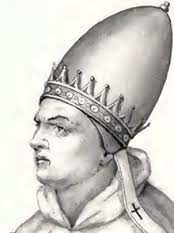
Pope Leo VII was the 126th pope. HIs reign happened in a politically turbulent era for the papacy as an institution. As the successor to Pope John XI, Leo assumed the mantle of the pontiff from a predecessor whose mother had been the true power behind the throne of the church and the Papal States.
In his short reign of only three years, Pope Leo VII carried out numerous acts of land grants and allowed for the Jewish people in Germany to be expelled in one the first of such tragic Catholic Church episodes.
Election and Beginning of the Papacy of Pope Leo VII
Little is known of the early life of Pope Leo VII. It is most likely that he served as a priest of St. Sixtus and a Benedictine monk before becoming the bishop of Rome. His predecessor Pope John XI was thrown into prison by the Duke Alberic II of Spoleto in Italy who then ensured that Leo would become installed as the next pontiff. Among this Alberic’s various titles and important positions, he was also the prince and senator of the Romans.
Leo then reluctantly took over the leadership role of Western Christendom under pressure from Duke Alberic. The situation in the peninsula was perilous to the point that in 936 A.D. Leo VII asked the famed Abbot St. Odo of Cluny to negotiate the end to a struggle that saw Rome under siege.
These combatants who had become involved in a war were Alberic II of Spoleto, who was now calling himself the King of Italy, and Hugh of Provence, who also aspired to the role as king.
Leo was desperate to reach a settlement that would allow for peace to be restored to the city. The Abbot Odo was successful in getting the siege of Rome lifted by arranging for a marriage alliance between the families of Alberic and Hugh of Provence. Alberic married the daughter of Hugo and retained his influence over Rome while Hugh lifted the siege.
Acts of Pope Leo VII
Leo’s primary acts while in office were the Bulls of Leo, comprised mostly of land and privilege grants to a number of monasteries. The order of Cluny especially benefited from his generosity. He also sent a letter up to the German Archbishop Frederick of Mainz.
The goal in the letter was to encourage a work of reformation that Prince Henry I the Fowler was doing with Otho I his son. Pope Leo appointed Frederick as his German representative and vicar for the entire Germanic realm. The pope gave Frederick all necessary authority to move against any clerics who were not practicing church teaching strictly.
In a crucial moment for the church, Leo VII refused to permit the archbishop to force convert and baptize the Jews living in Germany. Unfortunately, Leo did give him authority to expel those Jews who did not convert to the Catholic faith from their resident cities throughout Germany.
Pope Leo VII Quick Facts
- Born – in Rome in the ninth century
- Birth Name – Leo
- Died – July 13, 939 A.D.
- How he died
Leo is believed to have died of natural causes on July 13, 939 A.D. The church buried him in St. Peter’s Basilica following his death. - Papacy began – January 3, 936 A.D.
- Papacy ended – July 13, 939 A.D.
- Successor – Pope Stephen VIII
Interesting Facts About Pope Leo VII
Pope Leo VII received the papal throne through the influence and insistence of Senator Alberic, also the prince of the Romans and Duke of Spoleto.
The majority of Leo’s papal bulls were his grants of land to monasteries.
Pope Leo was a huge patron of the Abbey of Cluny.
As pope, Leo VII reigned for only three short years.
Leo made the tragic decision to permit the expulsion of the Jews from their homes in German cities and lands, though he would not permit them to be force converted against their wishes.
More Popes Named “Leo”
Leo I (St.) (#45) (the Great) (440 – 461)
Leo II (St.) (#80) (682 – 683)
Leo III (St.) (#97) (795 – 816)
Leo IV (St.) (#104) (847 – 855)
Leo V (#119) (903 – 904)
Leo VI (#124) (928)
Leo VII (#127) (936 – 939)
Leo VIII (#132) (963 – 964)
Leo IX (St.) (#153) (1049 – 1054)
Leo X (#218) (1513 – 1521)
Leo XI (#233) (1605)
Leo XII (#253) (1823 – 1829)
Leo XIII (#257) (1878 – 1903)